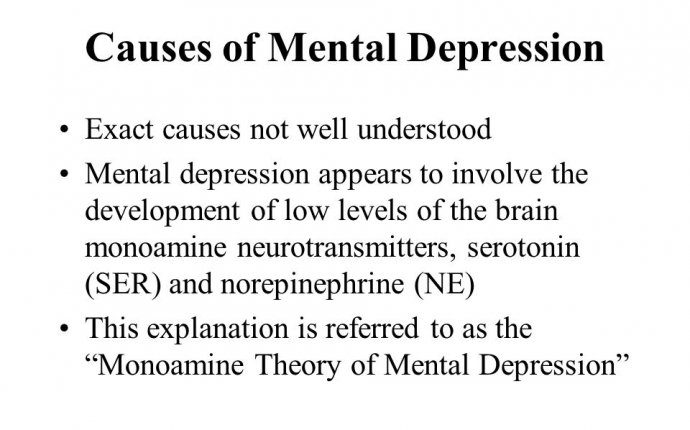
causes of mental depression
Depression is a real illness that impacts the brain. Anyone suffering from depression will tell you, it’s not imaginary or “all in your head.” Depression is more than just feeling “down.” It is a serious illness caused by changes in brain chemistry. Research tells us that other factors contribute to the onset of depression, including genetics, changes in hormone levels, certain medical conditions, stress, grief or difficult life circumstances. Any of these factors alone or in combination can precipitate changes in brain chemistry that lead to depression’s many symptoms.
Depression is a serious condition. It’s also, unfortunately, a common one. The World Health Organization characterizes depression as one of the most disabling disorders in the world, affecting roughly one in five women and one in ten men at some point in their lifetime. It is estimated that 21% of women and 12% of men in the U.S will experience an episode of depression at some point in their lifetime.
Depression does not discriminate. Men and women of every age, educational level, and social and economic background suffer from depression. There is no area of life that does not suffer when depression is present. Marriage, parenting, friendships, careers, finances – every aspect of daily living is compromised by this disease. Once an episode of depression occurs, it is also quite likely that it will recur. And the impact of depression can be even more severe when it occurs in combination with other medical illnesses such as diabetes, stroke, or cardiovascular disease, or with related disorders such as anxiety or substance abuse.
The problems caused by depression are made worse by the fact that most people suffering from the disease are never diagnosed, let alone treated. The good news is that when depression is promptly identified and treated, its symptoms are manageable and there are many effective strategies for living with the disease. Depression and bipolar disorder are both treated most effectively in their earliest stages when symptoms are less severe.
What causes depression?
Although scientists agree that depression is a brain disorder, the debate continues about exact causes. Many factors may contribute to the onset of depression, including genetic characteristics, changes in hormone levels, certain medical illnesses, stress, grief, or substance abuse. Any of these factors alone or in combination can bring about the specific changes in brain chemistry that lead to the many symptoms of depression, bipolar disorder and related conditions.
What are the symptoms of depression?
Depression commonly affects your thoughts, your emotions, your behaviors and your overall physical health. Here are some of the most common symptoms that point to the presence of depression:
Feelings:
- Sadness
- Hopelessness
- Guilt
- Moodiness
- Angry outbursts
- Loss of interest in friends, family and favorite activities, including sex
Thoughts:
- Trouble concentrating
- Trouble making decisions
- Trouble remembering
- Thoughts of harming yourself
- Delusions and/or hallucinations can also occur in cases of severe depression
Behaviors:
- Withdrawing from people
- Substance abuse
- Missing work, school or other commitments
- Attempts to harm yourself
Physical problems:
Of course, all of us can expect to experience one or more of these symptoms on occasion. An occurrence of any one of these symptoms on its own does not constitute depression. When healthcare professionals suspect depression, they commonly look for clusters of these symptoms occurring regularly for two weeks or longer, and impacting functional aspects of the person’s life.
Could you be suffering from depression?
Together with a healthcare provider, you can find out whether what you are experiencing is depression or bipolar disorder, and chart a course to feeling and functioning better. This website provides tips and tools for starting that conversation with your primary care physician or nurse practitioner, or with a community health professional. See .
Prior to engaging your doctor or healthcare provider, you may find it helpful to know more about how depression and bipolar disorder are diagnosed. Experts commonly employ a series of questions called a screening tool to identify depression. To walk yourself through the same questions, click on . Once you have completed the questionnaire, you can share your answers with a professional to determine the best course of action.
How is depression treated?
There are several strategies for treating depression. Depending upon each individual’s characteristics and symptoms, healthcare professionals may employ one or more types of that rely upon a sequence of interpersonal treatment sessions with a trained professional. In addition, clinicians may suggest that a patient try one of a number of different ., including improvements in sleeping and eating habits, physical activity and stress reduction have also proven very helpful in managing symptoms. To learn more about the many options available for treating depression, click on and .









